 |
| |

SPACE WEATHER
NOAA Forecasts |
|
Updated at: 2026 Mar 04 2200 UTC
FLARE |
0-24
hr |
24-48
hr |
CLASS M |
20
% |
20
% |
CLASS X |
01
% |
01
% |
 Geomagnetic Storms:
Geomagnetic Storms:
Probabilities for significant
disturbances in Earth's magnetic field are given for three activity levels: active, minor
storm, severe
storm
Updated at: 2026 Mar 04 2200 UTC
Mid-latitudes
|
0-24
hr |
24-48
hr |
ACTIVE |
20
% |
45
% |
MINOR |
05
% |
25
% |
SEVERE |
01
% |
01
% |
High latitudes
|
0-24
hr |
24-48
hr |
ACTIVE |
20
% |
10
% |
MINOR |
35
% |
25
% |
SEVERE |
30
% |
60
% |
|
|
|
 |
|
|
|
| |
|
|
|
| |
This is an AI Free Zone: Text created by Large Language Models is spreading across the Internet. It's well-written, but frequently inaccurate. If you find a mistake on Spaceweather.com, rest assured it was made by a real human being.
|
|
|
BEWARE OF LOST SATELLITES: Satellites are often lost during extreme geomagnetic storms. The reason: Models of Earth's upper atmosphere break down during some storms, introducing errors in estimates of satellite drag. A new study published in Space Weather solves the problem using a clever trick. Instead of modeling the atmosphere, researchers from MIT analyzed decades of satellite orbits to learn how spacecraft respond to space weather. When a storm hits, those historical patterns reveal what satellites are likely to do next. Read the original research.
LUNAR ECLIPSE REVEALS HOT SPOTS ON THE MOON: Of the millions of people who witnessed yesterday's total eclipse of the Moon, amateur astronomer "Wah" in Canada saw a lunar disk like no other. "I used a thermal camera to observe the eclipse," he explains. "The difference was amazing!"
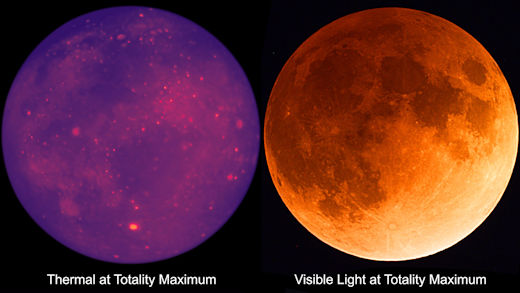
Wah's rare photo reveals a landscape dotted with hot spots glowing like stars strewn across the lunar terrain. There are 37 hot spots in total, headlined by craters Tycho, Plato, and Aristarchus.
This has been done only a handful of times in the Space Age, usually by large research telescopes. The earliest thermal eclipse observations came from infrared telescopes in the 1960s, before spacecraft explored the Moon. One classic experiment observed the Dec. 19, 1964, total lunar eclipse, producing thermal maps showing more than a thousand hot spots corresponding to rocky craters.
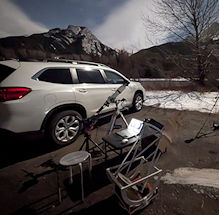 Wah's image was recorded at a wavelength of about 12 microns, where the Moon shines by its own heat rather than reflected sunlight. "My setup (pictured right) included a 640x512 thermal camera and a 12-inch Newtonian telescope," he says. Wah's image was recorded at a wavelength of about 12 microns, where the Moon shines by its own heat rather than reflected sunlight. "My setup (pictured right) included a 640x512 thermal camera and a 12-inch Newtonian telescope," he says.
Normally, the surface of the full Moon is sizzling hot after two weeks of unremitting sunlight. But when Earth's shadow falls across the Moon during an eclipse, the sunlight switches off. Some parts of the lunar surface cool faster than others. Fine moondust loses heat rapidly, while young blocky craters hang on to their warmth, creating prominent hot spots.
Photos like this are not just novelties. When properly calibrated, they can measure the thermal inertia of lunar regolith and map different kinds of rock types in potential landing zones. With NASA aiming to return to the Moon, this kind of information could be as golden as a total eclipse.
more images from Wah: #1, #2, #3, #4.
Realtime Eclipse Photo Gallery
Free: Spaceweather.com Newsletter
THE RAINBOW ROSE FROM SPACE: This is no ordinary rose. It shimmers with all the colors of the rainbow, and it has been to the edge of space:
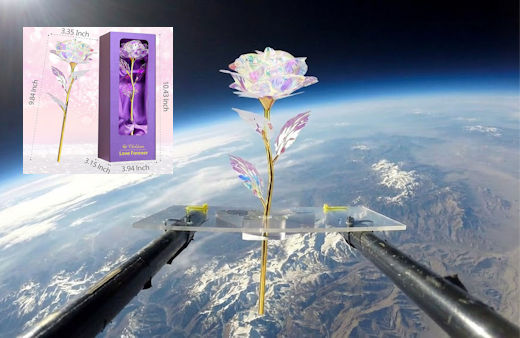
You can have it for $127.95. The rainbow rose flew through the stratosphere on Jan. 24th carried by an Earth to Sky Calculus cosmic ray research balloon. The artificial bloom comes with a greeting card showing the rose in flight, and telling the story of its journey to the top of Earth's atmosphere. It makes a great birthday, anniversary, or (coming soon!) Mother's Day gift.
Far Out Gifts: Earth to Sky Store
All sales support hands-on STEM education
Realtime Aurora Photo Gallery
Free: Spaceweather.com Newsletter
Realtime Space Weather Photo Gallery
Free: Spaceweather.com Newsletter
Every night, a network
of NASA
all-sky cameras scans the skies above the United
States for meteoritic fireballs. Automated software
maintained by NASA's Meteoroid Environment Office
calculates their orbits, velocity, penetration depth
in Earth's atmosphere and many other characteristics.
Daily results are presented here on Spaceweather.com.
On March 04, 2026, the network reported 6 fireballs.
(6 sporadics)
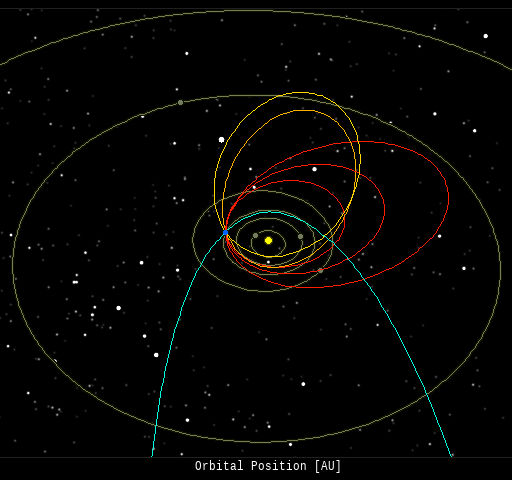
In this diagram of the inner solar system, all of the fireball orbits intersect at a single point--Earth. The orbits are color-coded by velocity, from slow (red) to fast (blue).
[Larger image] [movies]
Potentially Hazardous Asteroids ( PHAs)
are space rocks larger than approximately 100m that
can come closer to Earth than 0.05 AU. None of the
known PHAs is on a collision course with our planet,
although astronomers are finding new
ones all the time.
On March 5, 2026 there were 2349 potentially hazardous asteroids.
 |
Recent
& Upcoming Earth-asteroid encounters:
| Asteroid |
Date(UT) |
Miss Distance |
Velocity (km/s) |
Diameter (m) |
| 2026 DO10 |
2026-Feb-27 |
6.6 LD |
9.2 |
15 |
| 2026 DF14 |
2026-Feb-27 |
0.7 LD |
15.4 |
22 |
| 2026 EB |
2026-Feb-27 |
5.1 LD |
9.6 |
86 |
| 2026 DP6 |
2026-Feb-27 |
4 LD |
10.7 |
12 |
| 2011 CL50 |
2026-Feb-27 |
13.4 LD |
4.5 |
12 |
| 2026 DC14 |
2026-Feb-27 |
5.7 LD |
8.3 |
6 |
| 2026 CR4 |
2026-Feb-27 |
10.6 LD |
17.3 |
54 |
| 2020 FV4 |
2026-Feb-27 |
16.3 LD |
8.7 |
30 |
| 2026 EA |
2026-Feb-28 |
14.5 LD |
7.6 |
64 |
| 2026 DG1 |
2026-Feb-28 |
7.2 LD |
12.3 |
21 |
| 2007 DG8 |
2026-Feb-28 |
10 LD |
9.9 |
32 |
| 2026 DO11 |
2026-Feb-28 |
9.5 LD |
12.1 |
21 |
| 2026 DS5 |
2026-Mar-01 |
6 LD |
17.6 |
19 |
| 2026 DR11 |
2026-Mar-01 |
1.4 LD |
5.3 |
8 |
| 2026 DM10 |
2026-Mar-01 |
10.8 LD |
17.7 |
24 |
| 2026 DT8 |
2026-Mar-02 |
12.3 LD |
5.2 |
13 |
| 2011 EH17 |
2026-Mar-02 |
15.8 LD |
16.5 |
39 |
| 2026 DM14 |
2026-Mar-02 |
10.1 LD |
13.8 |
34 |
| 2026 DX6 |
2026-Mar-02 |
2 LD |
6.7 |
7 |
| 2026 DQ10 |
2026-Mar-03 |
4 LD |
13.1 |
25 |
| 2026 DR14 |
2026-Mar-03 |
16.6 LD |
8.4 |
66 |
| 2026 CB3 |
2026-Mar-03 |
13.9 LD |
8.9 |
33 |
| 2026 CX4 |
2026-Mar-03 |
7.6 LD |
12.3 |
43 |
| 2026 CD1 |
2026-Mar-03 |
6.4 LD |
10.9 |
61 |
| 2026 DK4 |
2026-Mar-03 |
7.8 LD |
8.5 |
23 |
| 2026 DZ7 |
2026-Mar-04 |
15.2 LD |
10.9 |
39 |
| 2026 DA1 |
2026-Mar-04 |
12.9 LD |
1.9 |
17 |
| 2026 DQ8 |
2026-Mar-04 |
3.9 LD |
8.6 |
16 |
| 2026 DE14 |
2026-Mar-04 |
19 LD |
5.2 |
23 |
| 2026 DM15 |
2026-Mar-06 |
12.3 LD |
7.9 |
98 |
| 2021 ER |
2026-Mar-06 |
6.3 LD |
4 |
14 |
| 2017 BM123 |
2026-Mar-06 |
19.9 LD |
7.2 |
61 |
| 2026 DW14 |
2026-Mar-07 |
12.5 LD |
12 |
19 |
| 2026 DG7 |
2026-Mar-07 |
9.4 LD |
16 |
30 |
| 2012 DF31 |
2026-Mar-08 |
13.4 LD |
16 |
43 |
| 2026 DM8 |
2026-Mar-08 |
15.7 LD |
15.8 |
34 |
| 2026 DY7 |
2026-Mar-08 |
9.1 LD |
7.7 |
21 |
| 2026 DH11 |
2026-Mar-09 |
3.3 LD |
13 |
18 |
| 2026 DQ11 |
2026-Mar-09 |
13 LD |
10.3 |
41 |
| 2020 GE |
2026-Mar-09 |
16.1 LD |
1.3 |
8 |
| 2026 DE7 |
2026-Mar-09 |
18.9 LD |
9.5 |
41 |
| 2025 EK4 |
2026-Mar-10 |
14.7 LD |
10 |
55 |
| 2021 BW1 |
2026-Mar-10 |
14.6 LD |
4.1 |
18 |
| 2023 ET2 |
2026-Mar-11 |
7.8 LD |
12.7 |
3 |
| 2026 CC3 |
2026-Mar-11 |
4.1 LD |
1.7 |
11 |
| 2025 DP3 |
2026-Mar-11 |
9.4 LD |
9.1 |
27 |
| 2007 EG |
2026-Mar-15 |
4.5 LD |
7.8 |
44 |
| 2026 CR3 |
2026-Mar-16 |
19.5 LD |
9.1 |
78 |
| 2015 VO142 |
2026-Mar-17 |
2.7 LD |
3.1 |
6 |
| 2026 DP10 |
2026-Mar-17 |
10.5 LD |
10.8 |
51 |
| 2021 FS |
2026-Mar-18 |
18.2 LD |
7.2 |
9 |
| 2026 DP15 |
2026-Mar-19 |
5.3 LD |
7.7 |
25 |
| 2010 RA91 |
2026-Mar-22 |
4.7 LD |
9.9 |
68 |
| 2022 FY |
2026-Mar-24 |
10.1 LD |
6.5 |
9 |
| 2025 SP20 |
2026-Mar-25 |
18.8 LD |
11 |
12 |
| 2025 GL |
2026-Apr-03 |
9.8 LD |
6.4 |
5 |
| 2019 FQ1 |
2026-Apr-03 |
9.6 LD |
10.1 |
13 |
| 2023 DZ2 |
2026-Apr-04 |
2.6 LD |
7.2 |
50 |
| 2021 GN6 |
2026-Apr-06 |
5.8 LD |
7 |
14 |
| 2024 TB7 |
2026-Apr-07 |
4.9 LD |
7.5 |
5 |
| 2002 TB70 |
2026-Apr-07 |
13.4 LD |
9.2 |
162 |
| 2022 GE2 |
2026-Apr-10 |
12 LD |
9.2 |
15 |
| 2023 HB4 |
2026-Apr-12 |
16.8 LD |
8.7 |
15 |
| 2013 GM3 |
2026-Apr-14 |
0.7 LD |
7.4 |
20 |
| 2026 AC4 |
2026-Apr-20 |
10.7 LD |
1.2 |
21 |
| 2022 UG2 |
2026-Apr-20 |
16.3 LD |
10.3 |
13 |
| 2025 HQ4 |
2026-Apr-21 |
16.4 LD |
12.5 |
22 |
| 2026 BK2 |
2026-Apr-22 |
10 LD |
8.1 |
211 |
| 2022 UU8 |
2026-Apr-25 |
8.7 LD |
4 |
9 |
Notes: LD means
"Lunar Distance." 1 LD = 384,401 km, the distance
between Earth and the Moon. 1 LD also equals 0.00256
AU.
| |
Cosmic Rays in the Atmosphere |
SPACE WEATHER BALLOON DATA: Almost once a week, Spaceweather.com and the students of Earth to Sky Calculus fly space weather balloons to the stratosphere over California. These balloons are equipped with sensors that detect secondary cosmic rays, a form of radiation from space that can penetrate all the way down to Earth's surface. Our monitoring program has been underway without interruption for 10 years, resulting in a unique dataset of in situ atmospheric measurements.
Latest results (Nov. 2024): Atmospheric radiation is sharply decreasing in 2024. Our latest measurements in November registered a 10-year low:
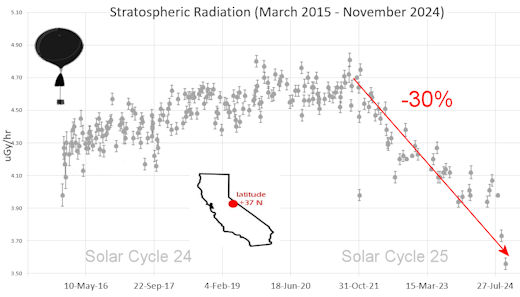
What's going on? Ironically, the radiation drop is caused by increasing solar activity. Solar Cycle 25 has roared to life faster than forecasters expected. The sun's strengthening and increasingly tangled magnetic field repels cosmic rays from deep space. In addition, solar coronal mass ejections (CMEs) sweep aside cosmic rays, causing sharp reductions called "Forbush Decreases." The two effects blend together to bring daily radiation levels down.
.Who cares? Cosmic rays are a surprisingly "down to Earth" form of space weather. They can alter the chemistry of the atmosphere, trigger lightning, and penetrate commercial airplanes. According to a study from the Harvard T.H. Chan school of public health, crews of aircraft have higher rates of cancer than the general population. The researchers listed cosmic rays, irregular sleep habits, and chemical contaminants as leading risk factors. A number of controversial studies (#1, #2, #3, #4) go even further, linking cosmic rays with cardiac arrhythmias and sudden cardiac death.
Technical notes: The radiation sensors onboard our helium balloons detect X-rays and gamma-rays in the energy range 10 keV to 20 MeV. These energies span the range of medical X-ray machines and airport security scanners.
Data points in the graph labeled "Stratospheric Radiation" correspond to the peak of the Regener-Pfotzer maximum, which lies about 67,000 feet above central California. When cosmic rays crash into Earth's atmosphere, they produce a spray of secondary particles that is most intense at the entrance to the stratosphere. Physicists Eric Regener and Georg Pfotzer discovered the maximum using balloons in the 1930s and it is what we are measuring today.
| |
The
official U.S. government space weather bureau |
| |
The
first place to look for information about sundogs,
pillars, rainbows and related phenomena. |
| |
Researchers
call it a "Hubble for the sun." SDO
is the most advanced solar observatory ever. |
| |
3D
views of the sun from NASA's Solar and Terrestrial
Relations Observatory |
| |
Realtime
and archival images of the Sun from SOHO. |
| |
information about sunspots based on the latest NOAA/USAF Active Region Summary |
| |
current counts of failed and deployed Starlink satellites from Jonathan's Space Page. See also, all satellite statistics. |
| |
Authoritative predictions of space junk and satellite re-entries |
| |
from
the NOAA Space Environment Center |
| |
fun to read, but should be taken with a grain of salt! Forecasts looking ahead more than a few days are often wrong. |
| |
from the NOAA Space Environment Center |
| |
the
underlying science of space weather |
 |
Got a chipped or cracked windshield that prevents you from seeing space weather events while driving? Get windshield replacement from SR Windows & Glass with free mobile auto glass service anywhere in the Phoenix area. |
| |
These links help Spaceweather.com stay online. Thank you to our supporters! |
 |
|
Baltimore Car Accident Lawyers
Onlinecasinoinformatie.com is an expert in comparing foreign online casinos for players in the Netherlands, offering reliable insights, clear reviews, and up-to-date information
Trusted casinos not connected to GamStop
Most Trusted seller for 1:1 super clone watches in the market
Premium quality super clone watches for sale with true 1:1 detailing
Buy Instagram Followers Text: from Smikky!
For the new best Norwegian casinos, visit nyecasino.com
Instant Famous, a reliable provider for followers, likes, and views on Instagram, Facebook, YouTube, TikTok, and more.
NonGamstopCasinos.net compares Non Gamstop Casinos and UK Casinos & Betting sites not on Gamstop. Independent casino reviews & exclusive bonus offers for British Gamblers.
Zamsino is one of the most popular online casino guides in the world.
Kiwislots.nz is the best free spins no deposit guide in New Zealand!
Find your best no deposit bonus in Germany at BetterBonus
Adlerslots hat die besten neuen Boni ohne Einzahlung in Deutschland für dich zusammengestellt!
BonusZonderStorting.com is de nummer 1 site om online casino's zonder storting in Nederland te vergelijken.
Vind de nieuwste free spins-aanbiedingen ter wereld op Leeuwslots.com.
Visit prestigewatches for best super clone watches and rolex replica for sale
|
| |
|
|
|
|
 |
|
 |

 |
©2021 Spaceweather.com. All rights reserved. This site is penned daily by Dr. Tony Phillips. |